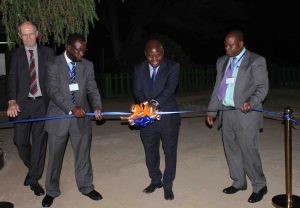
Agriculture
Malawi set to increase fish production
November 15, 2019 / Wahard Betha

Malawi is planning to scale up investment in aquaculture so that the country is able to meet fish demand for the local market and start exporting processed fish.
Speaking during the launch of the Aquaculture Round Table in Lilongwe, Director of Small and Medium Enterprises (SMEs) and Coordinator of Cooperatives in the Ministry of Industry, Trade and Tourism Wiskes Mkombezi explained that the government will work with different stakeholders to commercialize fish farming.
Mkombezi said it is shameful that the nation is importing fresh and canned fish regardless of the famous fish species that Lake Malawi has.
He said: “We do not have to be importing fish, but instead through aquaculture, we should be producing enough for local consumption and export.”
“It is sad to see foreign fish species like Kalapao from Mozambique flooding our markets despite us having enormous potential to develop our fish farming industry.”
He said it is high time Malawi developed its fish processing and export industry, which will create more employment opportunities and contribute to growth of the national economy.
Mkombezi urged fish farmers to take aquaculture seriously to increase local production and help in import substitution.
He said growth in aquaculture will also help in attracting tourists, as most visitors are always eager to taste the famous chambo delicacy.
Director of Fisheries in the Ministry of Agriculture, Irrigation and Water Development Friday Njaya commented that it is possible for Malawi to produce enough fish for the local and export market as the country has huge potential to develop aquaculture.
“As a nation, we have plenty of unexploited markets in countries like South Africa, Tanzania and Zimbabwe,” he said.
German Technical Cooperation (GIZ) Standing in Country Director Kornelius Schiffer hailed the launch of the round table saying it will assist in eradicating malnutrition cases as fish remains one of the major sources of animal protein.
Schiffer promised continued support to sustainably achieve the vision and the mission of the round table.
He pleaded with the Government to put in efforts to develop aquaculture“on the ground and not only on paper.”
The aquaculture round table is a collaboration of the Ministry of Industry, Trade and Tourism, Ministry of Agriculture, Irrigation and Water Development and GIZ.
Malawi fisheries sector contributes an estimated four percent to Gross Domestic Product(GDP)catering for livelihoods of some 1.6 million people including those living exclusively on the catch, processing and trade of wild fish stocks mainly from Lake Malawi.
In Malawi, fish plays an important role in food security as it caters for over 40% of the total national protein requirement.
The annual fish production increased from about 144-thousand tons in 2015 to 157-thousand tons in 2016, representing 8.98% increase of which aquaculture production was over 7-thousand tons.































